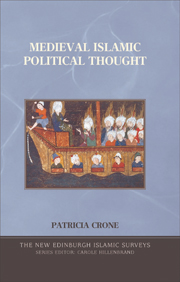Book contents
- Frontmatter
- Contents
- List of charts
- Preface
- Addenda and corrigenda
- I THE BEGINNINGS
- II THE WANING OF THE TRIBAL TRADITION, c. 700–900
- 4 INTRODUCTION
- 5 THE KHĀRIJITES
- 6 THE MUTAZILITES
- 7 THE SHĪITES OF THE UMAYYAD PERIOD
- 8 THE ABBĀSIDS AND SHĪISM
- 9 THE ZAYDĪS
- 10 THE IMAMIS
- 11 THE ḤADĪTH PARTY
- III COPING WITH A FRAGMENTED WORLD
- IV GOVERNMENT AND SOCIETY
- Charts
- Bibliography, abbreviations, and conventions
- Index and glossary
4 - INTRODUCTION
from II - THE WANING OF THE TRIBAL TRADITION, c. 700–900
Published online by Cambridge University Press: 05 August 2013
- Frontmatter
- Contents
- List of charts
- Preface
- Addenda and corrigenda
- I THE BEGINNINGS
- II THE WANING OF THE TRIBAL TRADITION, c. 700–900
- 4 INTRODUCTION
- 5 THE KHĀRIJITES
- 6 THE MUTAZILITES
- 7 THE SHĪITES OF THE UMAYYAD PERIOD
- 8 THE ABBĀSIDS AND SHĪISM
- 9 THE ZAYDĪS
- 10 THE IMAMIS
- 11 THE ḤADĪTH PARTY
- III COPING WITH A FRAGMENTED WORLD
- IV GOVERNMENT AND SOCIETY
- Charts
- Bibliography, abbreviations, and conventions
- Index and glossary
Summary
The political thought of the first two centuries after the conquests, the subject of the chapters that follow, was dominated by the tribal tradition of the conquerors, especially that of the northern Arabs, to whom Muḥammad and his first followers belonged. One of the most striking features of this tradition was its libertarian character: all adult males participated in political decision-making; nothing could be done without consensus. Modern scholars sometimes characterize the tradition as ‘democratic’. But it was not libertarian, let alone democratic, in the modern style. For one thing, it owed its character to the absence of a state, not to constitutional devices; and the tribal attitude to kings was ambivalent, as has been seen. For another thing, tribesmen did not see themselves as endowed with individual rights against the groups to which they belonged. If they resisted kings, they submitted to the tyranny of kinsmen. There was an immense premium on helping fellow-tribesmen (‘cousins’), staying together with them, deferring to the majority view, and respecting consensus. Kinsmen hung together so as not to hang separately. In short, the tribal tradition was not just libertarian, in the sense of opposed to overweening rulers, but also communitarian (or communalistic), in the sense of strongly attached to communal unity and solidarity.
- Type
- Chapter
- Information
- Medieval Islamic Political Thought , pp. 51 - 53Publisher: Edinburgh University PressPrint publication year: 2004



